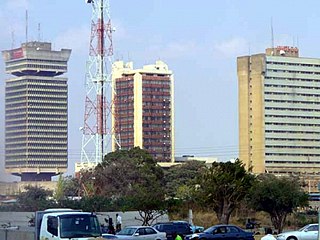
Zambia is a developing country and has achieved middle-income status in 2011. Through the first decade of the 21st century, the economy of Zambia was one of the fastest growing economies in Africa and its capital, Lusaka the fastest growing city in the Southern African Development Community (SADC). Zambia's economic performance has stalled in recent years due to declining copper prices, significant fiscal deficits, and energy shortages.

Solwezi is a town in Zambia. It is the provincial capital of the mineral-rich North-Western Province. Solwezi is also the administrative capital of Solwezi District, one of the eleven districts in the North-Western Province.

The Ministry of Energy, Northern Development and Mines (MENDM) was the ministry responsible for developing a safe, reliable and affordable energy supply across the province, overseeing Ontario’s mineral sector and promoting northern economic and community development. The ministry's head office is located in Sudbury. The last Minister of Northern Development and Mines was Hon. Greg Rickford. The Ministry's programs also include the Northern Ontario Heritage Fund, and the creation and funding of local services boards to provide essential services in remote Northern Ontario communities which are not served by incorporated municipal governments.

The Northern Development, Mines, Natural Resources and Forestry is a government ministry of the Canadian province of Ontario that is responsible for Ontario's provincial parks, forests, fisheries, wildlife, mineral aggregates and the Crown lands and waters that make up 87 per cent of the province. Its offices are divided into Northwestern, Northeastern and Southern Ontario regions with the main headquarters in Peterborough, Ontario. The current minister is Greg Rickford.

Mark James Mwandosya is a Tanzanian CCM retired politician and a former Member of Parliament for Rungwe East constituency.
Vedanta Resources Limited is a global diversified mining company headquartered in London, England. It is the largest mining and non-ferrous metals company in India and has mining operations in Australia and Zambia and oil and gas operations in three countries. Its main products are Zinc, Lead, Silver, Oil & Gas, Iron Ore, Steel, Aluminium and Power. It has also developed commercial power stations in India in Odisha and Punjab.

Despite abundant natural resources and a relatively small population, New Zealand is a net importer of energy, in the form of petroleum products. The ratio of non-renewable and renewable energy sources was fairly consistent from 1975 to 2008, with about 70 percent of primary energy supply coming from hydrocarbon fuels. This ratio decreased to about 60 percent in 2018. The proportion of non-renewable energy varies annually, depending on water flows into hydro-electricity lakes and demand for energy. In 2018, approximately 60% of primary energy was from non-renewable hydrocarbon fuels and 40% was from renewable sources. In 2007 energy consumption per capita was 120 gigajoules. Per capita energy consumption had increased 8 per cent since 1998. New Zealand uses more energy per capita than 17 of 30 OECD countries. New Zealand is one of 13 OECD countries that does not operate nuclear power stations.
An energy minister is a position in many governments responsible for energy production and regulation, developing governmental energy policy, scientific research, and natural resources conservation. In some countries, environmental responsibilities are given to a separate environment minister.
Zambia, officially known as the Republic of Zambia, is a landlocked country in Southern Africa. The neighbouring countries are the Democratic Republic of the Congo to the north, Tanzania to the north-east, Malawi to the east, Mozambique, Zimbabwe, Botswana, and Namibia to the south, and Angola to the west. The capital city is Lusaka, located in the southeast of the country. The population is concentrated mainly around the capital and the Copperbelt to the northwest.

Drinking water supply and sanitation in Benin has been subject to considerable progress since the 1990s, in particular in rural areas, where coverage is higher than in many other African countries, and almost all development partners follow a national demand-responsive strategy, which has been adopted in 1992. New strategies to increase water supply in rural and urban areas have been adopted in 2005 and 2006. Tariffs in urban and rural areas are usually high enough to cover the costs for operation and maintenance.

Water supply and sanitation in Zambia is characterized by achievements and challenges. Among the achievements are the creation of regional commercial utilities for urban areas to replace fragmented service provision by local governments; the establishment of a regulatory agency that has substantially improved the availability of information on service provision in urban areas; the establishment of a devolution trust fund to focus donor support on poor peri-urban areas; and an increase in the access to water supply in rural areas.
A Ministry of Energy or Department of Energy is a government department in some countries that typically oversees the production of fuel and electricity; in the United States, however, it manages nuclear weapons development and conducts energy-related research and development. The person in charge of such a department is usually known as a Minister of Energy or Minister for Energy.

The Ministry of Energy and Natural Resources, abbreviated KeTSA, is a ministry of the Government of Malaysia that is responsible for energy, natural resources, land, mines, minerals, geoscience, biodiversity, wildlife, national parks, forestry, surveying, mapping and geospatial data.
Water supply in Cambodia is characterized by a low level of access in rural areas compared to relatively high access to an improved water source in urban areas. In 2015, 76% of the population had access to "improved" water, 100% in urban areas and 76% in rural areas. Still, in 2015, around 9 million did not have access to "improved" water.

Copperbelt Energy Corporation Plc (CEC) is a Zambian electricity generation, transmission, distribution and supply company with operations in Zambia and Nigeria. The company is listed on the Lusaka Stock Exchange

The Mtwara Development Project is a major infrastructure development project involving southern Tanzania, northern Mozambique, eastern Malawi and Eastern Zambia. The goal of this project is to provide road, rail and waterway access from the surrounding region to the Port of Mtwara. The region and the corridor has been neglected by the respective governments for over 40 years and the recent discovery of oil, gas and various minerals has kick started the development of the project. A road and rail link is to be built from the port of Mtwara to Mbamba Bay on Lake Nyasa to link Malawi to the corridor and further road links into Mozambique will facilitate access to northern Mozambique.
Edith Zewelani Nawakwi is a Zambian politician and economist by profession. She is the first woman in Zambia to hold the post of Minister of Finance following her appointment in 1998 since Zambia's independence 33 years previously to that time. She was also the first woman to hold that post in the SADC region. She is the President of the Forum for Democracy and Development under which she ran for president at the 2016 general election.
Richard Musukwa is a Zambian politician. He currently serves as Member of the National Assembly for Chililabombwe.
In 2014, public expenditure on health in Zambia was 2.8% of GDP, among the lowest in southern Africa.












